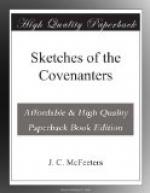These were the days of Melville, Welch, and Boyd, who, with other men, mighty in the Lord, withstood the king to his face, and the government with its threats and penalties. When the Church was in jeopardy, the Lord Jesus Christ had His chosen servants, able and willing to defend the faith. Like the prophets of old, they lifted up their voices in the high places, wrestled with principalities and powers, uttered their testimony as with the voice of thunder, and cheerfully sealed their testimony with their blood.
Among the champions of that day, Robert Bruce, an eminent minister of the Gospel, took his place in the thickest of the fight. He was a large man, dignified and commanding in appearance; the countenance, physique, intellect, and spirit denoting true kingliness and strength. He may have been a descendant of his famous namesake, Robert Bruce, one of Scotland’s great kings; his heart was just as heroic and patriotic. This soldier of the cross was strong because he lived in the bosom of God’s love; his life was fragrant with heaven’s atmosphere. He had a keen conscience. When urged to accept the ministry he at first refused, but that refusal caused such remorse that he said, he would rather walk through half a mile of burning brimstone than have the mental agony repeated.
Bruce, during his early ministry, was greatly beloved by the king. Such was his delight in him that he was chosen to anoint the king’s bride and place the crown on her head. Three years after this pleasant event he incurred the king’s wrath by discountenancing his majesty’s authority over the Church. Being commanded to perform a certain service in the pulpit he resolutely refused. To forfeit thus the royal good will, and take the risk of consequences, required courage of the highest type. But Bruce was a man of public spirit and heroic mind, equal to the occasion, through the abiding Spirit of God, that wrought mightily in him.
When matters were going from bad to worse, in his relation to the king, he attended a meeting with a few other ministers, contrary to the king’s proclamation, to take counsel concerning the Church. A delegation was appointed at this meeting to wait on the king, and urge their plea for relief. Bruce was the spokesman. The king received the delegates, but listened with impatience. He was in bad humor; anger flushed his face. “How durst you convene against my proclamation?” he said. “We dare more than that, and will not suffer religion to be overthrown,” was the swift reply. Bruce, after this interview, quickly felt the power of the law. His property was seized; he was driven from home; and, on permission to return, was required to cease preaching. This he refused to do, finally consenting to quit for ten days. That night he fell into a fever, and suffered such terrors of conscience, that he resolved that he would die ere he would make a promise like that again.




